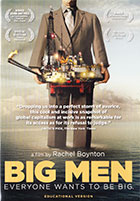
Big Men 2013
Distributed by Outcast Films, 511 6th Avenue Suite 398, New York, NY 10011; 646-512-2596
Produced by Rachel Boynton
Directed by Rachel Boynton
, color, 99 min.
Middle School - General Adult
Petroleum Industry and Trade, Postcolonialism, International Trade, Politics
Date Entered: 11/05/2015
Reviewed by Christopher Lewis, American University Library, American UniversityIn Ghana , the term “big men” is a colloquial expression for men with money and power, a condition to which many aspire. The title of the documentary is fitting in that it describes the motivations of most of the principal characters in this film about the opening of the oil industry in Ghana, which is contrasted with the rampant corruption in nearby Nigeria where the oil industry is over 50 years old.
The film, directed by Rachel Boynton (Our Brand is Crisis), begins with the story of Ghanaian businessman George Owuso who, in 2003, acquired drilling rights from the Ghana National Petroleum Corporation for an unexplored offshore block known as the Jubilee Field. Owuso then partners with an American drilling company, Kosmos Energy, to fund and coordinate the costly exploration in exchange for a major stake in any discoveries. Also drawn into the venture were two large private equity firms, Blackstone Capital Partners and Warburg Pincus, which provided the capital to Kosmos in exchange for a cut of any profits. In 2007, oil is discovered and over the next four years the story unfolds like a chess match between business leaders and the elected officials - all of whom feel entitled to the profits. To complicate matters, a new president and ruling party come into power after the drilling contract is signed and the offshore oil is discovered. Fears about the exploitation of their natural resources by outside interests, following bitter experiences with earlier gold mining contracts, slow down the negotiations. A slump in the global economy and the simultaneous crash of the oil price add layers of high drama and expose how brutal business deals can become when there are billions at stake.
Interwoven in the many turns of the Ghana Kosmos story are episodes from the messy conflicts that are haunting Nigeria, where life has gotten worse for the average Nigerian since oil was discovered in the 1950s. The film cites that an estimated $440B was stolen, mostly by politicians, between 1960-1999 from oil exports coming out of the Niger Delta. For years, a militant underground has been sabotaging pipelines to disrupt production. There’s a black market for a cheap fuel called condensate gas and another black market run by corrupt politicians who illegally tap wells and sell the oil for private profit, a practice referred to as “bunkering.” There is even a story of oil field contractors giving kickbacks from clean-up contracts to the militants who sabotaged the pipelines in the first place.
The fact that the filmmaker devoted several years to filming as the story developed and had access to many private moments make for compelling drama. The tension of egos, pride, and distrust pushes the story along yet it’s played out in a mannered “just business” style, and even the dishonored and humiliated walk away with a hundred million dollars or more. The use of the Nigerian situation is an illuminating counterpoint to the Kosmos negotiations in that it represents what can happen to a government corrupted by a bonanza of easy money, from selling off a resource instead of traditional work and investment. One is left to ponder whether Ghana can forge a new path.
It’s a brilliant bit of storytelling so will be of interest to a broad audience and will be of special interest to courses on post-colonial development in Africa and international business. Highly recommended.